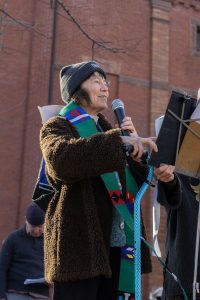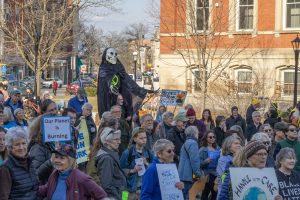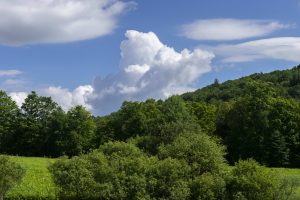Rev. Margaret was quoted in the press release published by Episcopal News Service, “Sixteen Bishops Authorize Use of Liturgical Resource for Creation Season” (August 14, 2023). She wrote, “We are delighted that so many congregations across The Episcopal Church will be exploring faithful new ways of praying with and for God’s good Earth.” Creation Season 2023: Celebration Guide for Episcopal Parishes is now available for those who integrate Creation Season into Sunday worship (Sept. 1- Oct. 4). The resource, updated from a version released last year, now includes the lectionary texts for Year A.
Author Archives: mbj
Transfiguration: When we see Earth shining
We couldn’t ask for more powerful readings than the ones we consider today on the feast day of the Transfiguration. Today we are summoned to the mountaintop to celebrate the transforming power of God. In our first reading, Moses is coming down from Mount Sinai, carrying the Ten Commandments that establish the covenant between God and God’s people. He has been praying on the mountain, listening to God with the love and attentiveness with which one listens to a friend (Ex. 33:11), and the skin of his face is shining (Ex. 34:29). He is radiant with God’s glory.
Today’s Gospel passage from Luke is also set on a mountain. Soon after Jesus tells his disciples that he will die and rise again, he takes with him Peter, John, and James and goes up on the mountain to pray. In the solitude of that holy mountain, with its long, sweeping vistas and its cold, clean air, Jesus’ prayer grows into an intense religious experience that recalls the experience of Moses. “While (Jesus) was praying, the appearance of his face changed, and his clothes became dazzling white” (Luke 9:29). To describe this change, Greek manuscripts use the word “metamorphosis” (metemorphothe); Latin manuscripts use the word “transfiguration” (transfiguratus est). Whatever you call it, it’s the same thing: at the top of the mountain, Jesus is swept up by the love that sustains the universe. What Dante calls “the love that moves the sun and other stars”1 so completely embraces Jesus that who he really is, who he has always been, is briefly revealed. A dazzling brightness emanates from his face, his body, even his clothes. The sacred radiance at the center of reality is shining through him, bursting through his seams, streaming from his pores, and even the three sleepy disciples can see it. What just happened? The holy presence that secretly abides within every person and every part of the created world has suddenly, briefly become visible to the human eye. The vivid image of Jesus lit up from within aligns with the experience of mystics from every religion who speak of a vibrant, shimmering energy or light that flows through everything, although usually we don’t see it. In Asia, the cosmic life force is called chi in Chinese and prana in Sanskrit, and in many Eastern traditions, enlightenment is associated with a flow of energy throughout the body.2 Christian mystics speak of the Holy Spirit as a Presence or energy that moves through our bodies and the whole body of Creation. For Christians, there is something deeply personal in this energy: it is the dynamic, creative Presence of the Holy Spirit. When we sense its presence in ourselves or in the outside world, God seems to light up the edges of things or to shine out from within them. We see the hidden depth behind the surface of ordinary reality. The eternal makes itself known to us, and we may experience it as light, although it is beyond the reach of ordinary sight. That’s where the language of paradox and poetry comes in, where mystics speak of a “dazzling darkness” or a “dark radiance,” just as in this passage Luke uses the language of paradox when he describes Jesus’ experience in terms of both a dazzling light and an overshadowing cloud (Luke 9:29,34). Something about perceiving that radiant darkness awakens our love.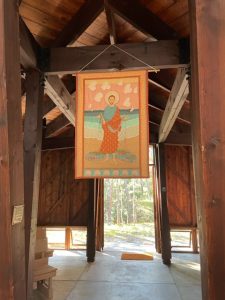
Rev. Margaret was quoted by The Shoestring (July 25, 2023) in the article “Climate Advocates Call Out Chase Bank’s Dirty Record.” “Desecrating the Earth is like spitting in the face of God,” she said. “No one should bank with an outfit like Chase Bank that is funding fossil fuels and contributing so decisively to the destruction of the sacred web of life.”
Walking our way to climate hope: Earth Sunday
May the grace of God enfold us, the love of Christ uphold us, and the Spirit of truth set us free. Amen.Friends, what a blessing to be with you as we celebrate Earth Sunday. Thank you for inviting me to join you and thank you to everyone who contributed to creating this special service. As you know, I serve our diocese as your Missioner for Creation Care, and I travel around preaching, speaking, and leading retreats about our vocation as followers of Jesus to protect and heal God’s Creation. If you’d like to know more about what I’m up to, I hope you’ll visit my website, RevivingCreation.org.
I’m especially happy to be here because of your efforts to heal the living world entrusted to our care. Let’s give a shoutout to your Green Team for the monthly Environmental Sunday Series and to your Youth Group. I shouldn’t have been surprised a few days ago when I received a newsletter from the Anglican Communion Environmental Network – a newsletter, by the way, that goes out to Anglicans all around the world – and noticed that it included a story of this church hosting a panel of teenagers advocating for bold, collective action to address climate change. As your rector commented when I shared this news: Whoa! Thank you for the ways you bear witness to the Lord of life.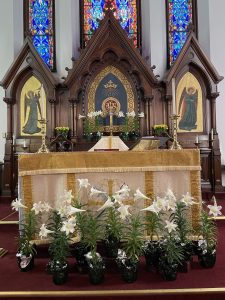
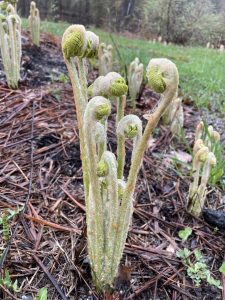
Rev. Margaret gave this opening presentation for “Preaching for God’s World,” a webinar on April 20, 2023, hosted by Church of England Environment Programme, which featured an international panel of speakers. Her presentation is posted on YouTube.
Why do we need to preach on creation care? Two reasons: Jesus commands it, and the world needs it. Let’s take these one by one.
At the end of Mark’s Gospel, Jesus commands, “Go into all the world and proclaim the good news to the whole creation” (Mark 16:15). The good news of God in Christ is to be proclaimed in word and deed to the whole creation – not only to human beings, but to all our fellow creatures and indeed to the whole web of life. From the first words of Genesis, when God created all that is and pronounced it “very good” (Gen. 1:30) to the last pages of the Book of Revelation, which speak of “a new heaven and a new earth” (Rev. 21:1), the sweep of our salvation history embraces the whole creation. What do we preach? We preach Christ crucified (1 Cor. 1:23). And Christ’s life, death, and resurrection touches every corner of the world. As St. Paul tells us, in Christ “all the fullness of God was pleased to dwell, and through him God was pleased to reconcile to himself all things, whether on earth or in heaven, making peace by the blood of his cross” (Col. 1:19-20). Christ came to reconcile all things – which means that when we preach, we hold in mind God’s desire to restore our connections to each other and to the land, God’s longing to heal our estrangement both from our fellow humans and from the rest of the natural world. When we preach, we hold in mind God’s heartbreak when we trample our brother-sister beings and when we contaminate the soil, water, and air upon which all life depends. With the psalmist, we proclaim, The Earth is the Lord’s, and all that is in it (Psalm 24:1), and thus we preach to restore reverence for God’s creation and to dismantle the fossil-fuel mindset that considers the natural world nothing more than inert material, just an object for us to exploit.
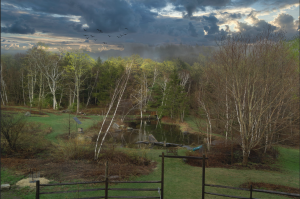
Not to preach about the climate crisis, not to preach about environmental degradation, not to preach about our calling to repair and restore the world that God entrusted to our care is to preach a Gospel that is far too small. It’s high time to quit preaching a narrowly anthropocentric Gospel and to remember that in the very first book of the Bible, God forged an “everlasting covenant” not only with human beings but also with “every living creature” (Gen. 9:8-17). Preaching about Earth care is central to proclaiming Christian faith. As the late Archbishop Desmond Tutu put it, the “supreme work”1 of Jesus Christ is to reconcile us to God, to one another, and to God’s whole creation.
That’s reason #1. The second reason to preach about creation care is that the world needs it. The world needs our preaching for pastoral reasons. Amid the accelerating trauma and losses caused by climate change, including droughts, floods, wildfires, and heat, our congregations need to hear about a God who honors and shares our climate grief, a God who weeps with us and who understands our outrage, fear, and sorrow as the living world around us is destroyed. This is a pastoral issue!
The world needs our preaching for prophetic reasons, too. Scientists tell us that we live at a decisive moment in human history: the only way to avert climate chaos and to protect life as it has evolved on Earth is to carry out a top-to-bottom transformation of society at a speed and scope that are historically unprecedented. So, we need sermons about our moral obligation to create a more just and habitable world. We need sermons about a God who gives high-consuming people the power to amend our lives, and sermons about a God who stands with those hurt first and hardest by a changing climate, which are usually low-income, low-wealth communities and communities of color. We need sermons about a God who calls us not to the quiet acceptance of a killing status quo but rather to active resistance, a God who gives us strength to bear witness to a love that nothing can destroy. The early Christians were so fired up by the love that transcends death and so willing to transform their society that they were accused of turning the world “upside down” (Act. 17:6), of acting “contrary to the decrees of the emperor” (Act. 17:7), and of obeying God rather than any human authority (Act. 5:29).
So, let’s hear some big, bold sermons that push back against climate “doomism” and hopelessness and that mobilize action for systemic change. Let’s take up our pastoral and prophetic vocation to preach Gospel hope in a time of human and planetary emergency.
Jesus calls us to preach good news to the whole creation, and the world needs that message as never before. Let’s do it. Let’s preach the whole Gospel, the whole good news.
_______________________________________________________________________________________________________________________________________
- Archbishop Desmond Tutu, “Foreword,” The Green Bible (New York, NY: HarperCollins Publishers (HarperOne), 2008, I-14.
Rev. Margaret’s speech was quoted in the Daily Hampshire Gazette article (March 22, 2023) that covered the climate rally in downtown Northampton to confront Chase Bank and the other big banks that fund fossil fuel expansion. “Fear, sorrow and anger have brought us here. But above all, we are here because we love, we love this beautiful earth,” she said. “We are here to stand up for life, and we are not alone. We will speak and sing and march in the company and with the support of all the creatures and elements with whom we share this planet.”
A fresh breeze blew on Tuesday as almost three hundred people gathered for a climate rally in Northampton, MA. We heard from several speakers, including elders, teenagers, and faith leaders, and we chanted and sang. Then we marched down both sides of Main Street, led by an exuberant marching brass band, pausing to chant at Bank of America and TD Bank. The crowd assembled at the intersection beside the new Chase Bank office that will open at 1 King Street. Holding signs, we lined the sidewalks and cheered as about a dozen customers took turns cutting up their credit cards. Accompanied by the band’s high-spirited music, we carried out a ceremonial cutting-up of an oversized Chase Bank credit card by an oversized pair of scissors. We pledged to picket Chase Bank regularly and to make it clear that no one should bank there until it stops funding fossil fuel expansion.
The Daily Hampshire Gazette covered the story here. Below is the statement I made as the rally began.
___________________________________________________________________________________________________________________________________
I am happy to say that this rally is one of about a hundred events taking place today across the U.S. as thousands of people gather inside and outside big banks to demand climate action.
Let’s begin by taking a moment to appreciate the living world around us, to notice the gift of blue sky overheard, to notice the trees and green-growing things that give us the oxygen that fills our lungs and with whom we exchange the elements of life as we breathe in and out, to notice the good Earth beneath our feet, supporting our every step.
We are here to stand up for life and we are not alone. We will speak and sing and march in the company – and with the support – of all the creatures and elements with whom we share this planet. We affirm our kinship with them, our interdependence. As we mark the vernal equinox, a day of balance between light and dark, we renew our commitment to bring life back into balance.
With every religious tradition and with people of faith and goodwill everywhere, we renew our insistence that the Earth is holy and that it was given to us to cherish and protect, not to destroy.
Some of us are here because we’re frightened. Big banks like Chase that fund fossil fuels expansion are pushing the planet to record levels of heat, causing massive droughts, floods, monster hurricanes, and fires. Yesterday’s report from the U.N.’s Intergovernmental Panel on Climate Change makes it frighteningly clear that unless we change course fast, we won’t be able to leave our children and our children’s children a habitable world.
Some of us are here because we’re sad. Big banks like Chase that fund fossil fuel expansion are unraveling the web of life before our eyes, and we weep to acknowledge what we have lost and may soon lose, from coral reefs and glaciers to predictable seasons and moderate weather.
Some of us are here because we’re angry. We’re morally outraged when big banks like Chase continue to pour money into building new pipelines and new fracking wells, although climate scientists around the world and organizations like the International Energy Agency and the United Nations have called for an end to any fossil fuel expansion.1
Fear, sorrow, anger may have brought us here. But above all, we’re here because we love. We love this beautiful Earth. We love its creatures. We love each other. The spirit of love that connects us to each other and to the land compels us to call upon big banks: Quit propping up fossil fuels! Quit funding climate chaos! Invest instead in clean energy and climate resilience and healthy communities!
People of faith and goodwill cry out: Let it be known. Let it be known. The Earth is sacred and we won’t stand idly by and let it be destroyed.
____________________________________________________________________________________________________________________________________-
1. Vanessa Arcara, “Now more than ever: Banks must act on climate”
#StopDirtyBanks #32123
Massachusetts and New England just marked the warmest January on record, and our region is nearing the end of what is likely one of its warmest winters yet.
Given the relentless pace of climate change – the ongoing news of extreme weather events, record floods and storms, unpredictable seasons, and vanishing species, with 18 separate billion-dollar weather and climate disaster events across the U.S. in just the last year alone – it is appalling to learn that Chase Bank is expanding into New England and plans to open a branch right here in downtown Northampton.

Of the four giant banks that lend to Big Oil – Chase, Bank of America, Citibank and Wells Fargo – Chase is the biggest investor. According to the Sierra Club, in the years since the Paris Climate Agreement, Chase has been the world’s largest banker of fossil fuels. From 2016 to 2020, it poured more than $316 billion into the fossil fuel industry.
Chase wants us to believe it’s committed to going “green,” citing, for example, its pledge to reach net-zero emissions from its lending and investment portfolios by 2050. But that pledge is only hot air until Chase stops financing the expansion of fossil fuels.
Bill McKibben points out that the offices of the four big banks – including the beautiful old Silverscape Designs building that Chase will occupy – might as well have a giant smokestack coming out the top, to remind us how much carbon they produce when they lend money to expand pipelines and fracking wells.
That’s why people will head to downtown Northampton on Tuesday, March 21, to protest Chase Bank’s funding of climate chaos. Our event (https://bit.ly/ChaseRally) is being organized by many local groups and will be one of scores of nationwide events that day – from Puget Sound to the southern tip of Florida, from Dallas to Washington, D.C. – as people stand up to the big banks that so recklessly fund further development of fossil fuels.
On March 21, we’ll gather at 4:30 p.m. in Pulaski Park for a short, peaceful rally that will feature a few speakers and some singing. Then we’ll march in procession down Main Street, passing two other banks notorious for funding fossil fuel projects, TD Bank and Bank of America.
Our final stop will be the big intersection of King and Main Streets, near the location of the new Chase Bank. We want everyone to know that Chase Bank is enabling the fossil fuel industry and to urge people not to bank at Chase. After all, we have many good, green, local banks and credit unions to choose from.
I don’t know exactly who will come, but here’s what I envision. I imagine that elders like me will be there, people who’ve experienced in our lifetime a dramatic, accelerating rise in global carbon dioxide levels driven by the burning of fossil fuels. When I was born in 1951, the level of CO2 in the air had for millennia never risen above the safe, stable level of 300-310 parts per million.
Today’s level has skyrocketed to over 417 parts per million, pushing the atmosphere into territory not seen for millions of years. Humans now breathe air that our ancestors wouldn’t recognize. Elders will join the rally because we’ve witnessed this unprecedented change and are determined to leave a habitable world to those who come after us. Stopping banks from funding new fossil projects is essential to stabilizing the climate and drawing down emissions.
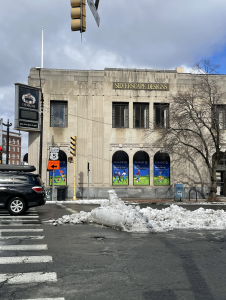
As I imagine it, parents will come to the rally cradling small children or pushing young ones in strollers. What is fiercer than a mother’s love? We parents want to safeguard the lives and health – indeed, the very future – of our beloved children. We’re willing to devote an hour to confirm that our love for our children and our neighbors’ children means moving our money away from banks that propel climate catastrophe and urging dirty banks to clean up their lending practices.
Students and young adults will be there, knowing that their future is at stake. Many young people are acutely aware of climate grief and anxiety and know that coming together to take action is a path to building a better future.
What’s more, opening a banking account with a green local bank rather than one of the giant banks turns out to be one of the most effective ways we can reduce our carbon footprint.
Faith leaders and members of diverse religions will join the rally because – whatever our tradition – we know that laying waste to the Earth and destroying the web of life violates our values. Faith communities have a long history of pressing successfully for social change, from child labor to women’s rights and abolition to the civil rights movement. We express our religious identity when we commit ourselves to mending a broken world.
Finally, both long-time activists and newcomers will join the rally, shaking off what experts call learned helplessness, the sense that we have no power to change a difficult situation. The truth is that we do have power to imagine a better world and can work together to bring that world into being.
Insisting that banks stop propping up the fossil fuel industry is a task that all of us can embrace. Let’s use our finances to fight climate change.
_______________________________________________________________________________________________________________________________
The Rev. Margaret Bullitt-Jonas is an Episcopal priest who works to advance climate justice for the two Episcopal dioceses in Massachusetts and for Southern New England Conference, United Church of Christ. She lives with her husband in Northampton.
This essay was published on March 14, 2023, as a guest column in the print edition of Daily Hampshire Gazette (Northampton, MA).
Because Earth Day – April 22 – lands on a Saturday this year, we have a wonderful opportunity to organize events that build community, strengthen our spirits, and provide opportunities to clean up our corner of the world.
The Creation Care Leadership Circle of the Episcopal Diocese of Western Massachusetts invites congregations in our diocese and beyond to gather outdoors in a place that needs healing – maybe a city park, riverbank, or stretch of woods. Bring whatever tools you need (e.g., gloves, trash bags, rakes, shovels).
We’ve created a simple, ecumenical outdoor liturgy that can be adapted to your own needs and location. “Healing Our Hearts, Healing the Land” is a 90-minute, family-friendly liturgy that includes time for walking, outdoor cleanup, and prayer. It could be followed by lunch or refreshments. Invite the public!
You can download the service here.
New! In 2023 the Anglican Communion released “Renewing the Life of the Earth: An Eco-Theology Resource.” Rev. Margaret contributed a 6-minute video about how the Church’s mission must change in a time of climate/ecological emergency. The new resource includes brief video presentations on ecological theology and practice from a range of voices across the Anglican Communion. It is designed for anyone who wants to start to engage with issues relating to ecological theology and practice. You can download the complete eco-theology resource here. It includes links to all the videos and a study guide that makes it easy for individuals and groups to explore and discuss the material. You can view Rev. Margaret’s video here
